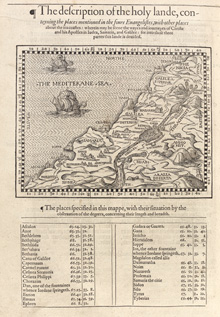For church and home
It was not until 1560 that the first English Bible appeared translated in its entirety from the original languages. Compiled and printed in Geneva by Protestant exiles from the Marian persecutions, the Geneva Bible (popularly termed the Breeches Bible on account of its idiosyncratic rendering of the garments worn by Adam and Eve) became the most widely-read of pre-1611 English translations. Its explanatory side-notes rendered it peculiarly suitable for private study, but were to earn the disapproval of conservative clerics and later of King James. A revision of the Great Bible was initiated by Archbishop Matthew Parker, partly as an official response to the Geneva. Known as the Bishops’ Bible, as the work of translation had been divided among the various bishops of the Church of England, the new version, appearing in 1568, was little admired. It never achieved the authorised status which Parker hoped for but nonetheless became the standard church translation for the next fifty years, and was to be the official basis of the King James Version.


